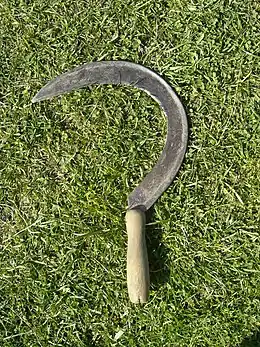sirpis
Latvian

Sirpis (1)

Mēness sirpis (2)
Etymology
From Proto-Baltic *serp-, from Proto-Balto-Slavic *sírpas,, from Proto-Indo-European *ser- (“crooked tree, hook, sickle”) with an extra suffix p. [1]
Cognates:
Cognates include Proto-Slavic *sьrpъ (Russian, Ukrainian, Belarusian серп (serp), Bulgarian сърп (sǎrp), Czech srp, Serbo-Croatian срп, Polish sierp, Upper Sorbian serp, Sanskrit सृणि (sṛṇi), Ancient Greek ἅρπη (hárpē), Latin sarpō (“to cut vines”), Hittite 𒊬𒉺 (šarpa-, “farming tool”).
Pronunciation
- IPA(key): [sìɾpis]
Noun
sirpis m (2nd declension)
- sickle (hand tool with a semicircular blade used for cutting grass, cereals, etc.)
- sirpis un āmurs ― hammer and sickle (Communist symbol)
- no rīta noskrien septiņas verstis līdz kunga druvai, ar sirpi nopļauj pūrvietu rudzu ― in the morning she ran seven leagues to get to (her) lord's corn fields, (and) with a sickle she mowed the rye
- crescent (an object or arrangement, especially the moon, in the form of a sickle, with tapering extremities), a moonsickle
- mēness sirpis ― moon crescent (lit. moon’s sickle)
- katrā mēnesī ir tikai viena pati reize, kad vakarstundā rietumu debesīs parādās jaunā mēness tievais un smailais sirpis ― every month there is only one time when, at night, in the western sky, the thin, pointed crescent (sickle) of the new moon appears
Declension
Declension of sirpis (2nd declension)
References
- Karulis, Konstantīns (1992) “sirpis”, in Latviešu Etimoloģijas Vārdnīca (in Latvian), Rīga: AVOTS, →ISBN
This article is issued from Wiktionary. The text is licensed under Creative Commons - Attribution - Sharealike. Additional terms may apply for the media files.